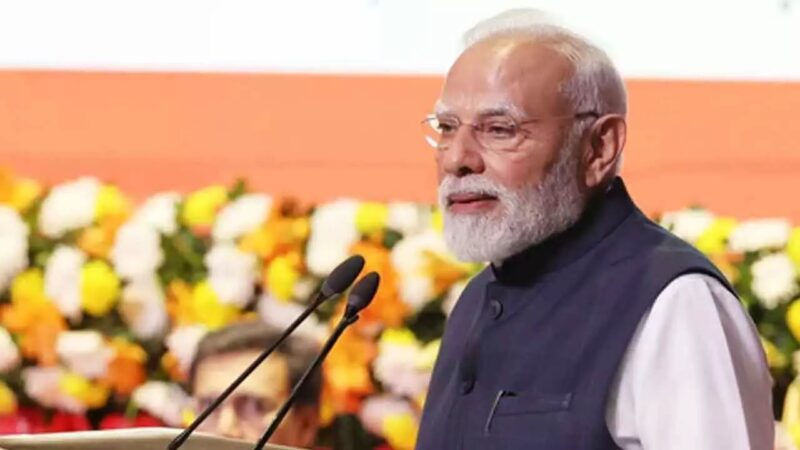
As the campaign for the Bihar Assembly elections reached its final stages, the political atmosphere in the state became heated, with top leaders exchanging sharp words. Prime Minister Narendra Modi launched a strong attack on the RJD-Congress alliance, asserting that “RJD and Congress can never develop Bihar.” He added, “These parties have ruled Bihar for years, but during their reign, lawlessness and cruelty thrived.”
In contrast, AIMIM candidate Tausif Alam made inflammatory remarks that further fueled the tension. Alam’s statement, “If the son of a fodder thief points a finger at Owaisi, I’ll cut it off. If he points an eye, I’ll gouge it out,” caused outrage across the political spectrum. The comments were condemned by leaders such as Modi, Nitish Kumar, Asaduddin Owaisi, Giriraj Singh, and Samrat Chaudhary, all targeting RJD leader Tejashwi Yadav.
However, Tejashwi Yadav maintained his calm throughout the controversy. Rather than engaging in personal attacks, he focused on his campaign’s core message of employment, education, and good governance. At rallies, he repeatedly emphasized his slogan: “Quietly, the lantern print.” Over just three days, Tejashwi addressed 51 rallies, promoting his 10-point strategy designed to sway the voters in favor of the Grand Alliance.
Tejashwi Yadav’s Key Campaign Issues
The cornerstone of Tejashwi Yadav’s campaign is employment. He promised to provide one government job per family within 20 months of assuming office. With nearly 40% of the electorate being youth, his campaign focuses on addressing their aspirations. He also committed to ensuring transparency in recruitment exams, permanent jobs for contract workers, and a fair domicile policy.
To appeal to young voters, Tejashwi changed his appearance by replacing the traditional kurta-pyjama with colorful T-shirts at rallies. This change was a strategic effort to project a youthful and dynamic image.
Women-Centric Welfare and Challenging Nitish Kumar’s Policies
Tejashwi presented several welfare schemes targeting women, in an effort to challenge Chief Minister Nitish Kumar’s strong female voter base. He introduced the Mai-Behan Maan Yojana, which promises ₹2,500 monthly to women, along with ₹30,000 on Makar Sankranti, 200 units of free electricity, and scholarships. Additionally, he pledged to restore the Old Pension Scheme (OPS). These promises were seen as a direct attempt to counter Nitish Kumar’s welfare politics that earned him the support of women through prohibition and reservation policies.
High Voter Turnout and Aggressive Ground Campaign
Tejashwi capitalized on the high voter turnout of 64.46% in the first phase, calling it a “wind of change” and a sign of growing support for the Grand Alliance. He worked relentlessly, holding up to 18 rallies a day, using a “momentum carry-forward” approach to energize his supporters and engage undecided voters. His aggressive ground campaign was complemented by press interactions and live sessions.
Alliance Unity and Outreach to Diverse Voter Groups
Tejashwi’s leadership as the Grand Alliance’s Chief Ministerial candidate signified rare unity among the coalition partners. He managed internal seat disputes effectively, securing key alliances, including with Mukesh Sahni’s support for RJD candidate Afzal Khan in Gaurabauram.
Breaking from the traditional Muslim-Yadav base of the RJD, Tejashwi expanded his outreach to EBCs, Dalits, and OBCs. His ticket distribution reflected this shift with 51 Yadavs, 19 Muslims, 11 Kushwahas, and 14 upper-caste candidates. His promise to increase EBC reservation from 20% to 30% further underscored his effort to broaden his political base.
Tejashwi’s Strategy Amid Provocation and Balancing Muslim Outreach
While facing provocative statements, such as those made by Tausif Alam and his brother Tej Pratap Yadav, Tejashwi maintained restraint and avoided hate-filled rhetoric. In Mahua, he even campaigned against Tej Pratap, emphasizing that “the party is bigger than family.”
Tejashwi also adopted a balanced approach to appeal to both Muslim and Hindu voters. He assured that “everyone will be taken care of in the future,” without making any explicit promises that could alienate voters from either community.
Digital Campaign and Future Prospects
Tejashwi also embraced digital media to connect with younger voters, using Facebook and X to share rally livestreams, memes, and campaign updates. His social media presence played a significant role in amplifying his message.
Veteran journalist Irshadul Haq noted that Tejashwi has successfully turned this election into a battle of “Tejashwi vs Others.” He added that Tejashwi’s restraint and avoidance of hate speech could work in his favor. Senior journalist Praveen Bagi observed that Tejashwi had made jobs a key issue, forcing other parties to adopt similar agendas. However, Bagi emphasized that Tejashwi’s challenge lies in maintaining visibility and consistency after the elections.
Tejashwi Yadav’s campaign has been marked by a combination of youthful energy, welfare promises, and digital engagement. His strategic focus on jobs and inclusivity, along with his ability to stay calm amid provocation, has made him the central figure of this election. Whether this will be enough to overcome the organizational strength and caste arithmetic of the BJP-JD(U) alliance remains to be seen, but Tejashwi has undeniably made this election about his leadership.